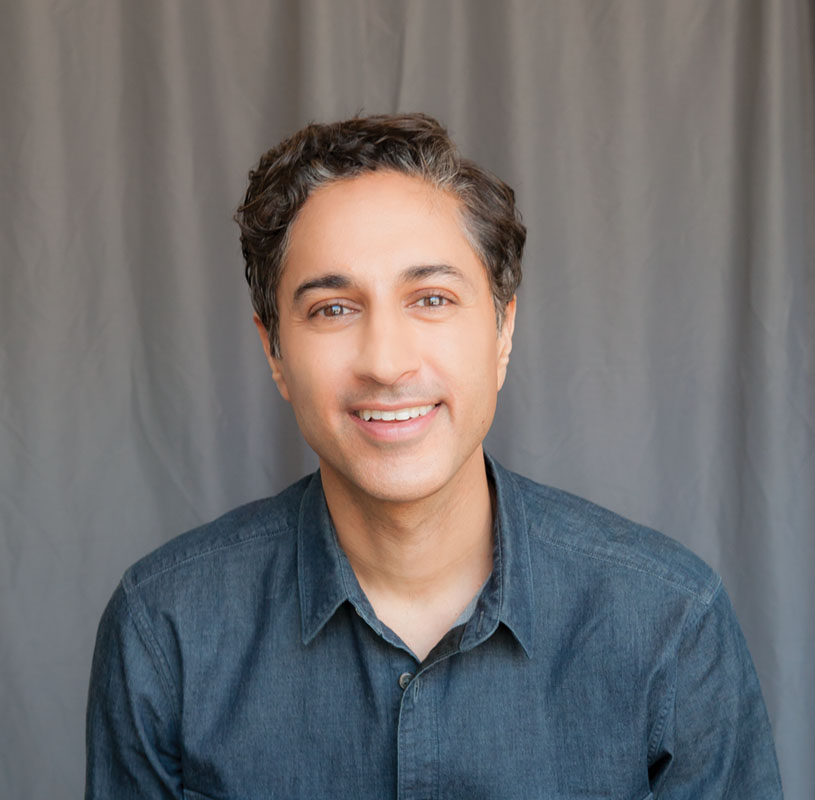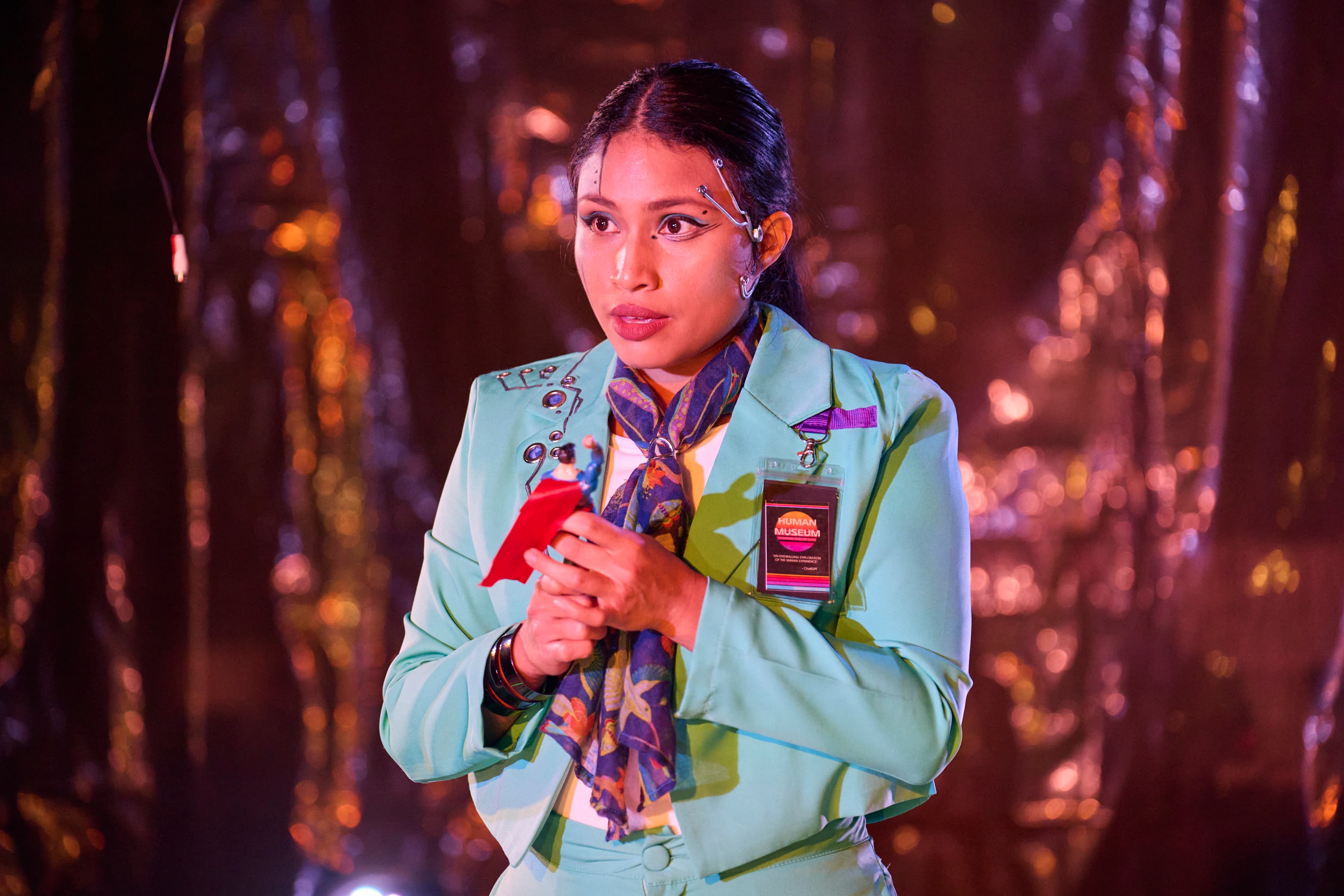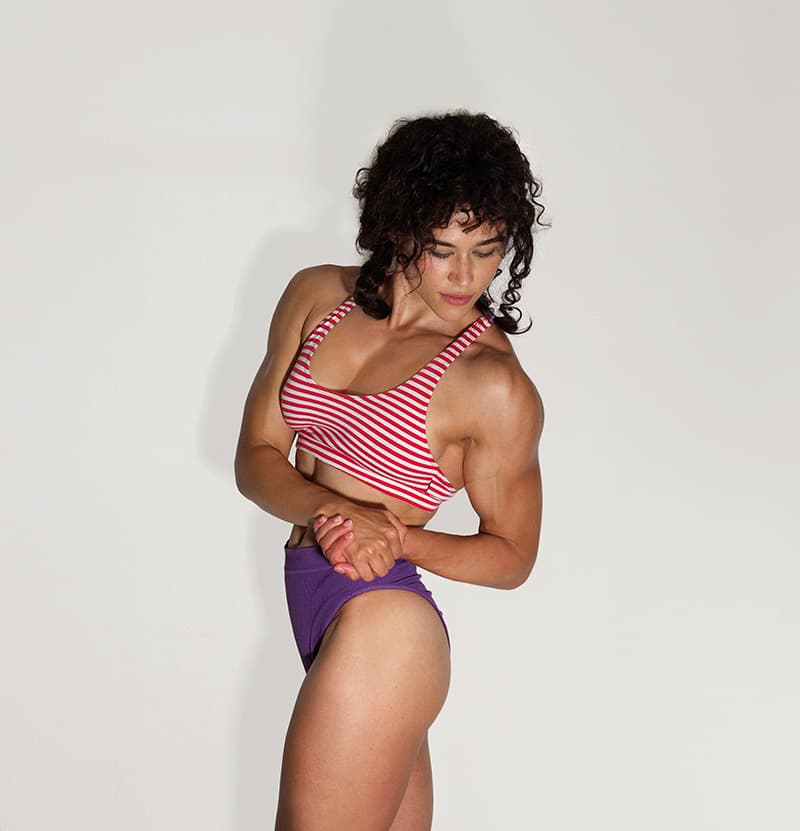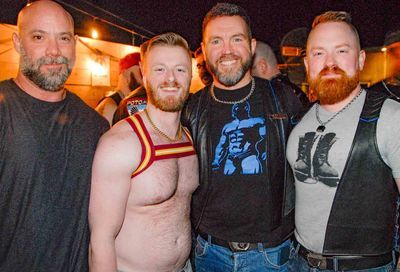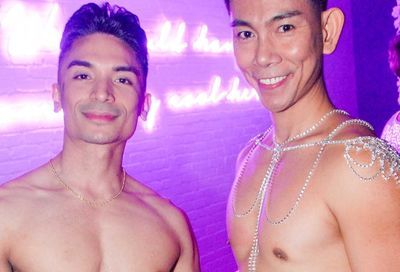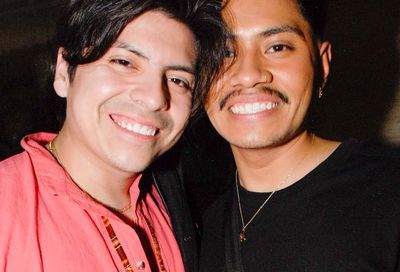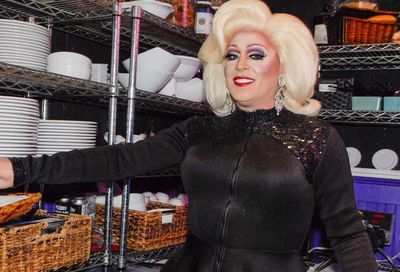The Queer, Gen Z Humor of Leo Reich
Gen Z comic Leo Reich brings his energetic, dazzlingly funny, queer-saturated stand-up show "Literally Who Cares!?" to HBO.

“I am so sorry! I’m so sorry!”
Leo Reich has suddenly reappeared on a Zoom screen from his home in London after being cut off mid-sentence moments ago.
“My laptop just fully died because it was connected to a socket that wasn’t on,” he explains. “The outlet wasn’t on, so it just fully died. I’m so sorry. Cut off completely mid-flow, but I’m back, and everything’s fine.”
Everything is, in fact, fine in the world of Leo Reich. Or, as he might put it, literally fine.
The spry and charming 25-year-old queer comic is about to see his stand-up show, Leo Reich: Literally Who Cares?!, which he first performed at the Edinburgh Fringe Festival in 2022 and later throughout the U.K. and in New York City, become an HBO Comedy Special.
The hour-long program is vibrant, colorful, even cinematic, with Reich in an electric state of perpetual motion, sometimes skipping joyfully, sometimes lunging and lurching at the audience as if possessed by a crazed Jane Fonda Workout tape from the ’80s. His comedy — a tart, attitude-drenched melange of cultural observation and hilarious self-adoration — exuberantly weaves its way through a slowly revealed narrative that encompasses, among other things, romance and affirmation.
Reich uses our expectations of what a stand-up comic should do against us, constantly throwing curve balls, and engaging the viewer that much more. There is no tuning out when Leo Reich, who likens himself to “a mean oracle” who is “not personally responsible for anything” is sermonizing — and that’s the point.
“What I am trying to satirize in the show,” he says, “is sort of the over-investment in the political potential of telling your story.”
Reich’s relatively severe queer onstage persona — he sports dramatic eyeliner, super-tight shorts, boots, and a shirt better suited for the gym — feels ready-made for a nouvelle production of Rocky Horror. On this call, however, he’s relaxed, friendly, sweetly down-to-earth, often speaking in impossibly long yet sensible, intellectually enriched sentences. He’s an astute observer of the human condition, particularly as it relates to his generation, Gen Z.
“I think that hopefully part of what I’m talking about in the show — part of what I think in general — is that [my] generation as a whole isn’t going to do anything,” he says of the current state of the world.
“The generation as a whole is fractured and self-contradictory, and no generation has ever had a consistent or unanimous worldview. And I think it’s nice and hopeful, this idea that the young will save the world, but it’s also not a new idea. Generations of people have hoped that the young will save the world. And simultaneously, over generations, people have always feared that the young will end the world.”
Reich, who is London-born and Cambridge-educated, feels like a fresh voice in comedy, a field that, one could argue, is overstuffed with too many comedians with similar routines struggling to make their voices heard. Reich ensures that his voice is heard, controlling the audience — and later losing control of them — with a vital stage presence that can only be called commanding.
He breaks into song several times during the hour, revealing a lovely voice, one custom-made for a West End or Broadway stint. He even posits a suggestion that he play Bobby in a gay version of Stephen Sondheim’s Company one day.
“A gay Company, I think, would be so fun,” he says, adding, “I mean, that’s the show I listen and sob to every night.”

METRO WEEKLY: I do want to start off by saying how funny I thought the special was. And also how ultimately affirming it was. I loved it.
LEO REICH: Thanks so much. That’s so nice. I’m so glad. Let’s end it here. That’s all I need — more compliments. Print that.
MW: It’s very, very sly, your production, because it carries forward a narrative. I don’t want to give too much away, but you’re actually telling a story through the threads of these jokes. What went into conceiving it?
REICH: It was quite a long process in the end, because it was the culmination of maybe four-ish years of doing standup and having attempted to write a show for the Edinburgh Fringe Festival in 2020 — and obviously that got canceled. And then going back to square one after that and reconstituting all of those different bits of standup and all the jokes I had and writing new stuff. And then just looking at this pile of material, sifting through it, and trying to find threads and the themes and what my preoccupations as a comedian seemed to be.
I guess it sort of developed into a kind of self-parody because of that, because I was sort of sitting in my childhood bedroom during the pandemic looking at all this material and going, “This person’s crazy. Whoever this guy is, this is a crazy person.”
What ended up happening was that became the bedrock of the show, deconstructing the paranoias and inconsistencies and paradoxes that I identified in both my own material as a comedian and my own life as a person, and trying to play them off against each other, those kinds of radically opposed points of view that was somehow all part of me as one person, and trying to play them off against each other in the most funny way I could.
MW: Obviously there’s a difference between doing something that’s so heavily produced like this and doing a smaller, more intimate stand-up routine. I imagine it’s more pressure.
REICH: I think it’s less about pressure. Standup comedy always is about having as direct a relationship with the audience as possible — the audience is in your hands and you have total control over the room. The pinnacle of being a good standup is being in total control, even with the sense of jeopardy that the audience has, because it’s live, that you might be out of control.
And obviously, when you are filming something you just don’t have that because it’s filmed. There’s a kind of frisson in the air of anything could happen that is so fundamental to the energy and the electricity of a live standup show. You don’t have that to play with, and you don’t have that pushing you forward. And also at the same time, actually I guess as a connected issue, you do not have a captive audience in the same way.
What’s so great about performing live is that people will be sort of shushed if they talk and glared at if they use their phones, and they can’t turn you off. And really, that’s the baseline: you have this audience and they’re going to listen to what you say. They might react badly, but you have them.
And with the filmed show, we approached it much more like a movie or a concert film because viewers can just turn it off. So we tried to make it visually impressive and innovate in terms of the form of a standup special, to make something that looks surprising and feels surprising and isn’t just a sort of paint-by-numbers job. I think was really important to us to try and draw people in and create the sense of intimacy that you get from a live performance in a filmed show.
MW: I think it succeeds. On my second viewing of it, I was paying a bit more attention to the camera angles that were chosen — a lot of lower angles specifically that we don’t always see in standup comedy. It’s more than just plant the camera down and you do your thing. There’s a lot going on there.
How much work did that take? What was the process there?
REICH: It took a lot of work from a lot of amazing people for all of those elements to come together. We started working with the director, Tom Hardiman, because we saw his amazing film, Medusa Deluxe, which is this one-shot, beautifully directed and produced murder mystery about a hairstyling competition, which is brilliant.
We saw that and we were like wow, that’s the kind of dynamism and really confident visual style that we felt could really suit the material of this show. And getting that [back] screen together and getting the animations on the screen and choosing those colors and those gradients and the way they meld together, that was all a big conversation. And trying to get it exactly right, and trying to choreograph it alongside the standup so that it would all fit together with the physical lights in the room as well….
So it was a massive process with a lot of extremely talented, hardworking people putting their heads together. And in many ways, my job was the easiest, which was do the show as I’d done it many times before. I didn’t really rehearse it without an audience because it was always going to have an audience. And I think we felt that the audience would always be so integral to the timing and the feeling of everything that if there was going to be a rehearsal, it felt like the audience was going to be an integral part of that rehearsal. So, we practiced it a bunch of times with the sound, and sometimes we’d have the backdrops playing on a projector behind me, but really the only time every piece of it came together was in those final two shows that we filmed.
MW: I will be honest, I’m not going to lie to you. I’m not a huge fan of watching standup shows on television. And this was different. It had so many cinematic moments. It engaged me from moment one all the way to the absolutely brilliant ending, which I won’t give away. But that ending — it left tears in my eyes.
REICH: Oh, you don’t know how much that means. That’s so brilliant because I think, like you’re saying, watching standup on a screen is a really strange and quite distancing and alienating experience when essentially you’re like, “Well, really I should be in the room for this.”
And I think what we tried to offset that with was making a film that stood on its own terms, as its own thing, and wasn’t just trying to recreate the experience of being in the room with the show, but adding to that experience and becoming something else in that process hopefully. So, I’m really glad you said that.

MW: I really love the way you occupy different types of personality spaces, for lack of a better phrase, within it. I mean, the first big laugh you got out of me was when you burst into song, and then stopped the audience from applauding: “No, we don’t have time for that!” I died. I thought, “Wow, he’s absolutely controlling.” But they pushed back midway through. They eventually go, “No, we’re going to applaud you whether you like it or not,” which is a really interesting psychological response from the audience.
REICH: And that happens a lot! People would essentially stop listening to me telling them what to do, which was brilliant because, essentially, I mean again, not to give anything away, but really the show tracks an increasing disjoint between me on stage and the audience, and how aligned we are and how in control of them I am, and how in control of myself I am.
And so, I really love that, at a certain point, the relationship between me and the audience is no longer “What I say goes” and starts becoming more distanced, the audience watching someone have an experience that they’re kind of voyeuristically looking at in a way. It’s no longer I’m telling jokes to make them laugh. It’s more I’m trying to justify my own existence, and they’re almost irrelevant to that.
So, yeah, I always loved that sometimes they would just clap anyway even though I would claim I didn’t want them to.
MW: It actually becomes a joke in itself. It’s a nice running through-line. The amount of energy you expend in that hour is extraordinary. I was sitting there thinking, when I was his age, I don’t think I could have come close to doing that for an hour. I mean, how do you do that?
REICH: I don’t know. I mean, honestly, as you can imagine, sort of halfway through a month-long run of that show, you do start to think, “Why didn’t I just do one of those shows where you stand in the middle and talk into the microphone? Because that seems to work for a lot of people.”
But I think that it was necessary to me, and it was built into how we conceived of the show that, by the end, I would be in that weird tiny, tight-fitting little outfit fully drenched with sweat and panting because on some level the show is about desperation — it’s about frantic-ness and anxiety trying to embody all of those things, and literally embody them in the sense that there’s sweat pouring out of my face.
I mean, at the end of the Fringe Festival, it was such a hot room in the middle of summer that by the end of the show I would basically not have any makeup left on my face. It would all have sweated off, often into my eyes.
So I would do the last song just truly not being able to see anything, my eyes stinging from sweat, and looking insane. There was fully a splash zone at the front of the audience that they’d get sweat flicked on them, but we always really liked that as an added level of visceral-ness. Especially in a show that is so much about detachment and alienation, I think to have that to ground the whole thing in my actual body and see me working for it, I think was helpful, just on a level of emotional connection with the personal stage.

MW: A lot of times we watch these shows and everything has to be perfect — we don’t see the performers sweat an ounce. And you are literally drenched in sweat by the end of the show. Interestingly, for gay men in particular, we are used to sweat in the gym. We are used to sweat in the clubs. We are already acclimated to sweat. So, watching a man sweat is almost erotic to us.
REICH: I was talking about the outfit a little bit, that a part of the choice behind that outfit, which is very tight shorts, quite exposing and quite sexualized. And I think so much of the show is about viewing myself as an object and sexualizing myself — and marketing myself as a sexual object as well is obviously a huge part of that.
There’s one song specifically where I really — it’s hypersexualized, where the black boots and tiny shorts really come into their own, hopefully. But yeah, that was definitely intentional as well that there’s a kind of unavoidable sexuality to this desperate person having a breakdown.
MW: Comics are a reflection of our lives, and I have always felt the best ones point a mirror back at us. There’s a social relevance to what is being poked fun at. And yet, as you say at the start of the show, you’re preaching to a kind of echo chamber situation, because they’re already attuned to your message. How do we get people who aren’t part of that echo chamber to pay attention and consider seriously the points that you’re making, if even through laughter?
REICH: I mean, it’s one of the most difficult challenges of our age, and I don’t think I’m going to be able to necessarily answer that question, especially in reference to my comedy show, as much as I think that comedy and standup has a social purpose.
What I am trying to satirize in the show itself is sort of the over-investment in the political potential of telling your story. And the kind of worthiness that comes along with that isn’t proportional to the effect that it could reasonably have on a political level. What part of the show is about is the danger of viewing politics and social change purely through the lens of your own personal experiences and your own individual life. And that’s something that I feel I’ve definitely found myself doing and that we’re sort of encouraged to do, and can be very isolating.
I think that on the echo chamber thing — I know the spaces that I perform in, they’re all quite alternative, queer, metropolitan spaces. I do a lot of cabaret shows. I do a lot of gay shows, and I really enjoy doing that. But I think that what I enjoy most is trying to make people a little bit uncomfortable or parody back to people some of the stuff that I think is the complacent liberal politics that goes on in those spaces, that I think is ripe for parody and is often parodied by the right in the most boring and eye roll-y and ridiculous way. I think that we owe it to ourselves to parody a bit from the left as well.
MW: One of the things you do is set us up for a punchline we’re likely expecting, and then take it in a completely different direction that no one could have seen coming. It’s a real art form. Has that been your secret talent all your life?
REICH: It’s definitely a rhythm that I really like — undercutting sort of worthy earnestness with cynicism or with irony, I think. I mean, it’s very British, I guess, on some level as well, a mistrust of any person or any belief system that seems too confident in itself, and to draw out the kind of inconsistencies of those beliefs. I think it’s really fun.
It’s simultaneously a style and a crutch, I guess, but it’s also how I feel about everything, which I think is probably a big theme of this show — wanting to believe something hopeful and wanting to invest in that hope but also having to do that with the simultaneous knowledge of all the ways in which that hope and that earnestness is ridiculous. And living with that tension and that paradox at the same time, and being able to hold both things, I think, is the real challenge. Well, definitely what I feel is a really big challenge, and I mean that in politics, but also in my personal life is to be able to know that two contradictory things are true and just move on is very difficult.

MW: Is there any comedy that you think of as off-limits?
REICH: I think always with that kind of question, it depends on what you mean. Is any subject off-limits? No. Are there ways of talking about stuff that isn’t funny and isn’t sensitive? Yes. There are ways of talking about almost every topic that is insensitive, aggressive, and unneeded.
And I think that to frame a conversation, about any art form, but specifically about comedy about what can and can’t be said is a very popular lens, but also a kind of counterproductive way of looking at it.
I think that we can just look at it as that’s quite bad comedy. If you are so bad at comedy that you can’t make the audience laugh with your perspective on a controversial issue, then that isn’t necessarily the fault of the sensitive audience. That might be the fault of the bad comedian. And that’s always how I’ve seen it.
I think framing the debate around what is and isn’t included in the idea of comedy is the wrong way of doing it. I’ve certainly done comedy before that’s definitely technically comedy that was really bad. Maybe not ethically, but certainly aesthetically bad. So, I think that should really be the focus: not going, “This actually isn’t comedy,” which comes up all the time, but instead going, “This sucks. Please improve.”
MW: I perked up when you suddenly disclosed that you were Jewish in the show because I’m Jewish. I guess I should have been able to tell by the last name, but you can never tell.
REICH: [Laughs.] Yeah, I mean it’s on the line, isn’t it? It’s on the line. It’s either really Jewish or really not Jewish, my last name.
MW: What was your life as a young Leo like?
REICH: I had quite a sort of very comfortable, lovely childhood in North London, where I still live now. I have my parents, and I have an older brother and a younger sister. Very nuclear family vibes, all very nice. I was a very shy boy. I went to an all-boy secondary school, which obviously ruined my life because that’s horrendous and should be illegal.
And I think that really, yeah, my high school experience was really complicated. I had a really difficult time both on a sexuality level, but also just on an interpersonal level about feeling understood by people. And I think that’s probably what drew me to comedy — it’s an amazing way to be able to present to yourself in a way that can be understood and present a perspective, even if that perspective is, “God, the world’s so weird, and I’m so confused.” It was really freeing to find that, to hear other people doing that. And that is, I think, why I became such a big comedy fan in my teens.
MW: What about your coming out?
REICH: I’m one of those people who probably didn’t massively need to come out at a certain point. I read as gay. So, that’s helpful and unhelpful in different ways. Certainly thought it was unhelpful at the time. And then eventually came out to my family when I was 19. I was doing standup, and I came out to them via standup at the Edinburgh Fringe Festival.
I’d been at university for one year, and I just did a standup set, knowing that they would be in the crowd, about being queer and trying to make it a fun, flippant, trivial thing rather than this really sort of serious confession, which I felt like doing that was a capitulation to the shame I was meant to feel about it.
Doing it via standup felt like a much more powerful and empowering way to go, “I’m in control of this. I don’t think it’s that serious. Let’s all move on with our lives.”
So, yeah, that’s how I did it.
MW: How did they take the news?
REICH: Yeah, really well. I mean, I had the most liberal upbringing ever, and I don’t think I ever really feared on any deep level that they would take it anything other than quite well. I was always extremely lucky for that.
I think always what I thought was, “If I’m this overwrought about telling my parents, God, imagine what it’s like for people whose parents won’t be okay with it,” because it was keeping me up at night. And my parents are lovely and were fine about it. They were fine.
I mean, it was kind of funny. I mean, I just tried to make the situation as funny as possible because, obviously, that is my way of dealing with stuff that’s difficult — to be like, “Yeah, it’s quite difficult, but it’s also ridiculous.” So, I just tried to do that, and I think it worked.
MW: Did they say to you later, though, “Why didn’t you just sit us down in the kitchen and tell us?” Did they have any complaints about your method of relaying the message?
REICH: No, no, never have. They’re not… I don’t think they would criticize my method in that way. And also I think as a family, we are not kind of “sit-down-talk-about-it” people. We’re not kind of spill your guts in a sincere way people. We keep it light. We’ll talk about anything, but we’ll try and keep it in perspective. I think there’s a real sense that we’re — I don’t know — when we’re all together, it’s, “God, we’re lucky that everyone is so nice, and we all love each other so much, so nothing can be really be that bad.”

MW: Sounds like a great family.
REICH: We try not to do the dramatics on quite the same level as you do in the States.
MW: How has your evolution as a gay man? I mean, you’re doing a standup that’s very queer. You’re wearing makeup. How has your life as a gay man been?
REICH: I mean, gosh, how long do you have? But it’s this sort of dual lens, which I think a lot of queer people have, which is that it simultaneously affects every single experience in your entire life, and also in a different way affects none of them once you’ve got to a certain point with it.
So, it’s so inextricable from absolutely everything that I do and feel that it’s almost unnoticeable to me now. And my experience, I guess, was one of mainly internal angst and isolation as a teenager, as a result of being in an environment that I didn’t feel responded massively positively — not only to the brute facts of being queer but also to the more cultural and behavioral elements of that.
The stuff that I liked and the way that I acted were as isolating as necessarily being like, “I’m sexually attracted to men.” So, it’s just as it is with everyone, I think a process of self-acceptance that is ongoing. And I think the thing that I realized more as I grow up is that that process is common to everyone.
I think that the thing that I felt very isolated by as a teenager partly was seeing my queerness as something that separated me from other people and made my experiences unintelligible to them. And I think as I got older, what I’ve really loved is finding out that really it’s almost the opposite a lot of the time, and that the experiences of loneliness and isolation, or the experiences of not being understood or the experiences of shame and self-loathing, all of that stuff is more or less common to everyone and can be a really amazing connective tool rather than a way in which you’re something that makes you completely different to everyone. It’s actually more something that is useful as a point of connection often.
MW: I need to bring up the word “literally” because that seems to be your thing, and of course is part of the show’s title. Is that something you say a lot in everyday life, or did you just decide, “That’s going to be my catchphrase?”
REICH: I just think it’s funny. It’s just funny to say when it’s just so deeply opposite of what I mean. I think so much a part of my humor, I guess, is saying quite confused things with total confidence and clarity. It’s really exaggerating the level to which I know something.
MW: The British pronounce the word so much differently than we do. You guys put the emphasis on the end, and we put the emphasis on the front end, or at least I do.
REICH: In the American accent, literally sounds so much stupider to me. It’s quite labored. You pronounce every fucking letter. And I say that with so much love.
MW: Do you have time for a romantic life? Are you dating anyone right now?
REICH: Oh, gosh. Whoa. That is the most depressing question of all. Not really. Not really. I wish. I wish. If anyone reads this and thinks, “Wow, what a charming guy,” get in touch. Instagram, Twitter, anything. You can put my number at the bottom.
MW: You’re not picky.
REICH: I’m not picky. No, not really. I find dating really hard. I know that’s literally the most basic standup premise of all time is, “Dating is hard, you guys,” but it is. It’s so hard.
MW: Why is it hard?
REICH: Well, it’s hard, I guess on a most basic level because of who I am as a person. And then if you want to make it more sort of general, if you’re someone like me who loves a romance, the space that exists in day-to-day life for romance, I think, is waning. It’s been depleted. The communal spaces, seeing people face-to-face, that kind of social life that used to, I feel at least anecdotally in my parents’ generation, bring people together in groups is so… I mean, it’s on its knees, I think.
So, it’s extremely hard. If you’re someone who has watched loads of rom-coms and thinks that that’s what life should be like to find a sense of romance. I mean, there’s nothing romantic about going on an app date. It’s anti-romantic. Clinical. It’s goal-oriented. It’s commercialized and corporate. That’s not getting me hard. I don’t know about anyone else. That’s fucking awful. That’s anti-sexual. So, this is why I’m a bad date, because I start with this rant.
MW: Could you have envisioned, from that first time doing stand-up at Edinburgh, actually having an HBO Special about to debut?
REICH: Absolutely fucking not. It’s the most insane thing that has ever happened. I’m still — I know this is such an eye-roll thing to say and such a boring thing for someone like me to say, but it truly is unimaginable to me, and it hasn’t sunk in any way.
I’m watching myself go through it in the third person, and I don’t know what’s going on. Even doing this show in New York, the idea that it would get to this point is so beyond the realm of anything that I considered possible, which is nice because I feel totally unprepared for it. I’m sure I’m going to crash and burn at some point, and that will be really fun because really everything’s a bonus after this point, I think. This could so easily be the end of the story, and I’d be like, “That was a pretty fucking good story. That’s better than I ever thought it would be.”
Leo Reich: Literally Who Cares?! premieres on HBO on Saturday, Dec. 16, at 10 p.m., and will also be available to stream on Max. Visit www.hbo.com or www.max.com.
Follow Leo Reich on Instagram at @leo_reich and on X at @leoistired.
Support Metro Weekly’s Journalism
These are challenging times for news organizations. And yet it’s crucial we stay active and provide vital resources and information to both our local readers and the world. So won’t you please take a moment and consider supporting Metro Weekly with a membership? For as little as $5 a month, you can help ensure Metro Weekly magazine and MetroWeekly.com remain free, viable resources as we provide the best, most diverse, culturally-resonant LGBTQ coverage in both the D.C. region and around the world. Memberships come with exclusive perks and discounts, your own personal digital delivery of each week’s magazine (and an archive), access to our Member's Lounge when it launches this fall, and exclusive members-only items like Metro Weekly Membership Mugs and Tote Bags! Check out all our membership levels here and please join us today!




